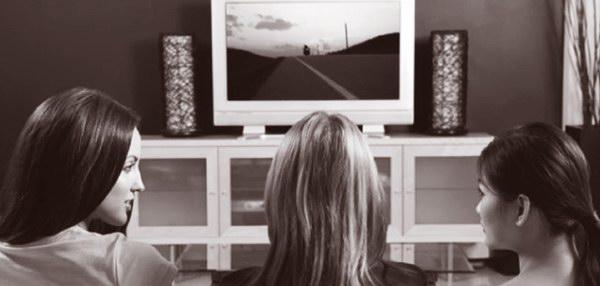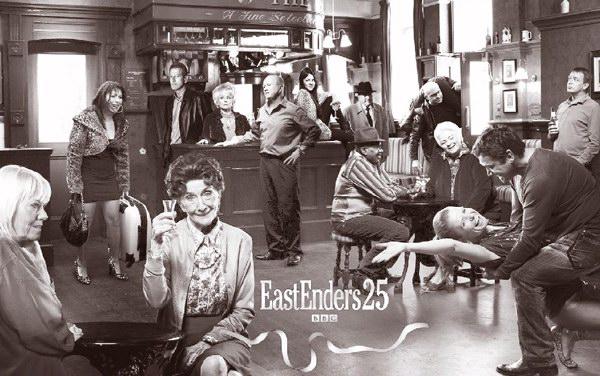Why Do We Like to Watch Soap Operas? 我们为什么喜欢肥皂剧?
By Polly Bryant 温纯/选注



For many of us, watching soap operas has become one of lifes little rituals—a way to unwind at the end of the day.1 Women, in particular, often become hooked on2 these long-running television series. Some cannot bear to miss a single episode, recording the entire series so they can watch it at will.3 They care about the characters, so much so that anger can even be felt when a story line takes an unwanted twist.4 Whats more, some extreme viewers even confuse the line between fictional character and real-life actor or actress, verbally abusing “bad” characters on the streets or in supermarkets.5 Such fans have become so caught up in a soap that they have illogically blurred fantasy and reality,6 as though they believe an actor really is the character they play.
Are Soaps Realistic?
In most soap operas, everything is magnified7. Statistics are clearly out of line with real life in most “ordinary” residential settings.8 In a soap, your chances of meeting a grisly end are hugely amplified when compared with true-life data.9 Accidents and illness may take away some of our favourite characters, but surely it has to be the chance of getting bumped off by murder that is the most unrealistic statistic of all.10 Countless acts of murder and manslaughter11 are committed in soap operas, usually all occurring within the same street or two. Well, you know where you would never want to move to!
Such high rates of murder are out of line with “real” life data, yet we have to remember that a soap opera is supposed to entertain us. It cant be completely realistic, otherwise it would be quite boring. Most peoples “real-life” would not be deemed interesting enough to air on television several times per week,12 year after year. Therefore, a soap can never be truly realistic if it is designed to entertain. Characters do have to face rather more than their fair share13 of problems. After all, a soap must have limits on the number of characters portrayed, both for easy-to-follow viewing (too many actors is confusing, plus relationships are not built up between on-screen characters and the watching public) and budgets.14
Sensitive Issues
That said, soap operas do try to approach many serious issues with accuracy and empathy.15 Drug and alcohol addiction, domestic abuse, terminal illness, gay marriage and abduction are all problems that have been tackled on-screen.16 Script writers17 and actors research such story lines thoroughly, in order to portray the issue with as much truth as possible. Sometimes, they meet with real-life people who have first-hand experience of the issue. Sometimes, charities18 that deal with such problems are approached.
When popular soap character Stacey Slater, played by Lacey Turner, discovered she had bi-polar disorder in EastEnders, the BBC approached charities such as Mind and The Bipolar Organisation (Manic Depression Fellowship), in order to ensure that they could create an accurate story.19 In another story line, actress Kacey Ainsworth, who played abused wife Mo Slater over a decade ago, met with three women who had suffered domestic abuse in real life. It is not only about creating an accurate story line to give the show credibility—the airing of such harrowing issues is sensitive when it is considered that some of the watching public will resonate with the topics due to personal experience.20
Escapism21
Die-hard soap fans like nothing better than to disappear into someone elses world for half an hour—even if that world is often fraught with problems and incidents that make their own lives seem like a box of chocolates.22 Getting caught up in the characters lives is all part of the escapism. A long-running series offers a comforting familiarity, a bit like putting on a favourite pair of slippers23. It is always there, ready to fill in that slot24 at the end of a day. Some soaps have even become part of the Christmas Day ritual—an occasion when viewers can usually be assured of watching some dramatic events unfold.25 Christmas on a British soap opera rarely goes well!
When you want a break from your own routine or a chance to forget your own problems, what better way than to become embroiled26 in someone elses for a while? And because soaps tend to be long-running shows—the first episode of Coronation Street 27 aired in 1960—there is none of the disappointment felt when a favourite serial comes to an end. In fact, getting hooked on a soap can be a gradual process, which can sometimes leave viewers unable to remember a time when they didnt watch it. Long-standing characters are followed as they grow up and journey through their lives (and sometimes deaths) like loyal, on-screen friends. And when something happens to a well-loved character, no matter how fictional, it can almost be like a grieving28 process for some people.
Even for those of us who are not, or who wont admit to, being quite so pulled in, soaps still make for easy watching. Regular viewers can switch on and relax, already familiar with the setting and the faces on the screen. It is not like watching a one-off29 drama, where we have to concentrate as we get to know the characters and the story line. With a favourite soap, we know whats what from the very second the theme tune ends.30
A Womans Ritual
Often, it is women who enjoy watching soap operas, whereas men do not share the same enthusiasm. When we think about the reasons for this, we should consider the emotional nature of females compared to their male counterparts. Men are typically practical, gravitating more towards action, sports, factual programmes, thrillers with conclusions or obvious humour.31 Women might like these too, but by nature they are often more empathetic, feeling emotions in a different way to men. Men are much less caught up in the psychological32 dramas of day-to-day life which is one of the main elements of soap operas that attracts women. Females tend to gossip33 more, whereas men discuss topics. Men obviously do care about relationships, but they are much less interested in discussing them, or in concerning themselves with other peoples. The emotional play-out of events does not resonate so naturally with men, who like to look for quick solutions to problems. Therefore, the ritual of soap-watching will always appeal more to women.
“Ordinary” People
Another factor that draws in34 viewers is the apparent “ordinariness” of many of the characters. British soaps resonate with their watching public because they reflect (to an extent) the ordinary man/woman on the street. Unlike the flashy35 American Soaps that we watched in the 80s, we often feel we can relate to our favourite characters. Whilst some aspects of soaps might be overly dramatic and unlikely, there is much for us to find understanding in. The typical, working citizen, who likes a drink and a bit of a banter in their local; the tribulations of relationships, marriage and divorce; the loneliness of the elderly; emotional dilemmas; struggles with money; gossipy chats with the hairdresser; teenage issues; interaction within the community—all of the aforementioned can hit a note of understanding within ourselves.36
Sometimes, issues aired can help us to better understand other people and their plights—not long ago, favourite Eastender Dot Cotton, played by the legendary June Brown, was viewed suffering from loneliness and depression.37 Recent history showed her on-screen husband sent into full-time residential care after suffering a stroke—after Dot tried to look after him at home but couldnt cope.38 Without going over the entire story, viewers are given an insight into the difficulties that might be faced as one ages, and the emotional traumas39 that might be experienced. Not only that, but as a result we are given a glimpse into the minds of some of our own elderly relatives or our ageing neighbours, struggling in isolation behind closed curtains.40
Understanding others in our society is important, and sometimes we can be educated via the television. Yes, some story lines are at best unlikely—but most soaps also approach serious issues in a conscientious41 manner. Our best soaps have remained popular over decades and across generations—and it doesnt look as though they are going anywhere soon.
1. ritual: 例行公事,老规矩;unwind:(使)心情轻松。
2. be hooked on: 被……迷住,对……着迷。
3. episode: (戏剧、电影、电视等的)一集,一出;at will: 随意,任意。
4. 他们如此关注剧中角色,以致当剧情发展不尽如人意时会感到愤怒。story line: 故事情节;twist: 意外转变。
5. 另外,有些极端的观众甚至混淆了虚构的角色和现实生活里的演员,以至于在街上或是超市里遇到饰演“坏蛋”的演员时竟然出言不逊。fictional: 虚构的,小说的;verbally: 口头地。
6. illogically: 没有道理地,不合逻辑地;blur: 模糊,混淆;fantasy: 幻想,空想产物。
7. magnify: 放大,夸大。
8. be out of line with: 与……不相符;residential: 居住的;setting: 场景,环境。
9. grisly: 可怕的,恐怖的;amplify: 夸大,夸张。
10. 意外事故和疾病会带走我们最喜爱的角色的生命,但毫无疑问的是,遭遇谋杀而丧命是最不现实的剧情。bump off: 杀死,谋杀。
11. manslaughter: 过失杀人。
12. be deemed: 被视为……;air: (用电视)播送。
13. fair share: 公平分配。
14. 毕竟,为了方便观众追剧(太多角色不仅会给观众造成混乱,也令其难以与荧幕上的人物建立联系)和制作预算的原因,一部肥皂剧塑造的角色数量有限。portray: 表现,表演;budget: 预算。
15. that said:(引导让步说法)即便如此;empathy: 同感,共鸣。
16. 吸毒酗酒、家庭暴力、晚期绝症、同性婚姻和绑架劫持都是荧幕上出现过的话题。terminal:(疾病)晚期的;abduction: 绑架,劫持。
17. script writer: 剧本作家,编剧。
18. charity: 慈善,慈善机构。
19. 在《东区人》中,当情节发展到蕾希·特纳扮演的斯泰西·斯莱特发现自己患有狂躁抑郁症时,英国广播电台为了确保故事逼真,特意与心理和狂躁抑郁症机构(英国的躁狂抑郁症协会)等慈善机构进行了接触。bi-polar disorder: 狂躁抑郁症,与后半句中的manic depression同义;EastEnders:《东区人》,是一部英国电视肥皂剧,首次于1985年在英国广播公司播出。
20. 这样做不仅仅是为了通过准确的情节而让剧情显得真实可信——讲述这类令人难过的话题是十分敏感的,有些观众可能会由于个人经历而产生共鸣。credibility: 可靠性,可信度;harrowing: 悲惨的,令人悲伤的;resonate with: 使发生共鸣。
21. escapism:(以沉湎于空想或消遣的办法)逃避现实。
22. 铁杆粉丝最喜欢的莫过于从现实里消失半个小时,完全沉浸在别人的世界里——即便他人的世界也常常是问题重重和事故不断,相比而言自己的生活简直就像“一盒巧克力”那么美好。die-hard: 顽固的,死硬的;be fraught with: 充满的,伴随着的。
23. slipper: 拖鞋。
24. slot: 位置。
25. 有些电视连续剧已成为圣诞庆祝的一部分,圣诞节特辑通常为观众呈现特别的剧情。unfold: 呈现,披露。
26. embroil: (使事态)陷入混乱,使纠缠不清。
27. Coronation Street:《加冕街》,英国播放时间最长的一部超级电视肥皂剧。
28. grieving: 令人悲痛的。
29. one-off: 一次性的。
30. 对于极其喜爱的肥皂剧,只要主题曲一唱完,我们立马就知道下面要发生什么了。
31. 男人一般来说比较实际,更感兴趣的是动作片、体育运动、纪实节目和惊悚片等有结果或特别幽默的电视节目。gravitate: 受重力作用,被吸引;thriller: 恐怖小说,惊悚片。
32. psychological: 心理上的,情感的。
33. gossip: 讲八卦,说长道短。
34. draw in: 吸引。
35. flashy: 浮华的,俗丽的。
36. 最典型的场景就是,蓝领阶层喜欢在住处附近的酒吧饮酒逗乐,烦恼的人际关系、婚姻与离异,老年的孤独,感情困境,为钱所困,和理发师闲聊八卦,青少年问题,与邻里的互动——所有这些都能让我们有所感触。banter:(善意的)取笑;local: 住处附近的当地酒吧;tribulation: 苦难,艰难;dilemma: (进退两难的)困境,窘境;aforementioned: 上述的,前述的。
37. 有时候,电视里的话题能够帮助我们更好地理解他人及其痛苦。不久前,《东区人》里最受欢迎的角色——由著名演员茱恩·布朗饰演的多特·科顿,就在剧中遭受着孤独和抑郁的折磨。plight: 困境,折磨;legendary: 有名的,大名鼎鼎的。
38. 不久前的剧情是她在剧里的丈夫中风之后被送入了24小时监护病房,此前多特也想自己在家里照顾他,但却心有余而力不足。stroke: 中风。
39. emotional trauma: 情感创伤。
40. 不仅如此,通过剧情我们还可以窥见自己某些年迈的亲戚或邻居的内心,离群索居的他们正在紧闭的窗帘后面独自挣扎。glimpse: 一瞥;in isolation: 孤立地。
41. conscientious: 小心谨慎的,煞费苦心的。

